
Count Gyula Andrássy de Csíkszentkirály et Krasznahorka was a Hungarian statesman, who served as Prime Minister of Hungary (1867–1871) and subsequently as Foreign Minister of Austria-Hungary (1871–1879). Andrássy was a conservative; his foreign policies looked to expanding the Empire into Southeast Europe, preferably with British and German support, and without alienating Turkey. He saw Russia as the main adversary, because of its own expansionist policies toward Slavic and Orthodox areas. He distrusted Slavic nationalist movements as a threat to his multi-ethnic empire.

Count Gyula Andrássy de Csíkszentkirály et Krasznahorka the Younger was a Hungarian politician.
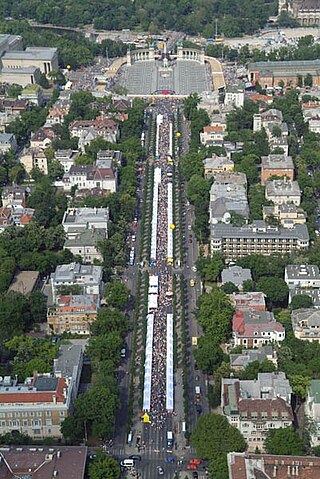
Andrássy Avenue is a boulevard in Budapest, Hungary, dating back to 1872. It links Erzsébet Square with the Városliget. Lined with spectacular Neo-renaissance mansions and townhouses featuring fine facades and interiors, it was recognised as a World Heritage Site in 2002. It is also one of Budapest's main shopping streets, with fine cafes, restaurants, theatres, embassies and luxury boutiques. Among the most noticeable buildings are the State Opera House, the former Ballet School, the Zoltán Kodály Memorial Museum and Archives, the Hungarian University of Fine Arts, and the Ferenc Hopp Museum of East Asian Arts.

The House of Andrássy is the name of a Hungarian noble family of very ancient lineage that was prominent in Hungarian history. The full family name is Andrássy de Csíkszentkirály et Krasznahorka. Csíkszentkirály is a town in modern-day Romania, now called Sâncrăieni, while Krásna Hôrka is a castle in Slovakia.

Bajcsy-Zsilinszky út is a station of the yellow M1 line of the Budapest Metro. It is situated under Andrássy Avenue close to its junction with Bajcsy-Zsilinszky street. It was formerly named Váczy körút station.
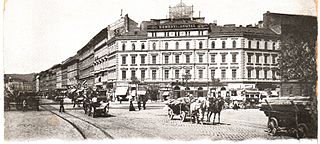
Oktogon is one of Pest's major intersections, located at the junction of the Grand Boulevard and Andrássy Avenue in Budapest, Hungary. This junction, one of the city's most important, is named for its octagonal shape.

Vörösmarty utca is a station of the yellow M1 line of the Budapest Metro. It is located under Andrássy Avenue near to its intersection with Vörösmarty utca. The street and station take their name from the poet and dramatist Mihály Vörösmarty.

Bajza utca is a station of the yellow M1 line of the Budapest Metro. It is located under Andrássy Avenue near to its intersection with Bajza street.

Tiszadob is a village in Szabolcs-Szatmár-Bereg county, in the Northern Great Plain region of eastern Hungary.

Oktogon is a station of the yellow M1 line of the Budapest Metro. The station is located under the Oktogon cross-roads where the Grand Boulevard and Andrássy Avenue intersect.

Opera is a station of the yellow M1 line of the Budapest Metro. It is located under Andrássy Avenue in front of the Hungarian State Opera House.

Kodály körönd is a station of the yellow M1 line of the Budapest Metro, under Kodály circus on Andrássy Avenue. Like the circus, the metro station takes its name from Zoltán Kodály who once lived in one of the buildings on the circus.
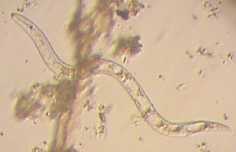
Dorylaimida (dorylaims) is a diverse order of nematodes with both soil and freshwater species.
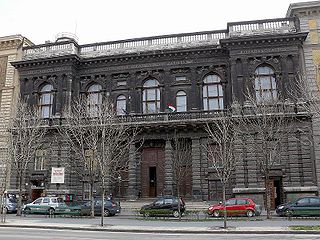
The Hungarian University of Fine Arts is the central Hungarian art school in Budapest, Andrássy Avenue. It was founded in 1871 as the Hungarian Royal Drawing School (Magyar Királyi Mintarajztanoda) and has been called University of Fine Arts since 2001.
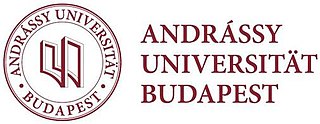
Andrássy University Budapest (AUB) is a private university in Budapest, the capital of Hungary. Andrássy University Budapest was founded in 2001 and is the only completely German-language university outside the German-speaking countries. As a European university in Hungary, it is supported by five partner states and also by Switzerland and the autonomous region of Trentino-South Tyrol.

Line 1 is the oldest line of the Budapest Metro, built from 1894 to 1896. It is known locally as "the small underground", while the M2, M3 and M4 are called "metró". It was the first underground on the European mainland, and the world's second oldest underground after the London Underground. It was finished by April 1896 and was inaugurated by the emperor of Austria-Hungary, Franz Joseph on 3 May 1896.
The Rhabditidae are a family of nematodes which includes the model organism Caenorhabditis elegans.
The Berlin Memorandum was a document drawn up by the three imperial world powers in 1876 to address the Eastern Question during the Crisis of 1875-1878. The purpose of the Berlin Memorandum was for the three imperial powers of Russia, Austria-Hungary, and Germany to address the state of relations between the Islamic Ottoman Empire and with the Christian peoples of the Balkans, with whom these imperial powers had international relationships and interests, and to correct the "Andrássy Note", a document that preceded the Berlin Memorandum and had similar intentions in creating an armistice and plan of reforms for the Balkans and the Ottoman Empire.

Sisi is a 2009 Austrian-Italian-German biographical drama television miniseries directed by Xaver Schwarzenberger and starring Cristiana Capotondi in the title role. It was produced by Sunset, Publispei, RAI and EosTV, with a budget of about 11 million euros. It depicts real life events of Empress Elisabeth of Austria.
















